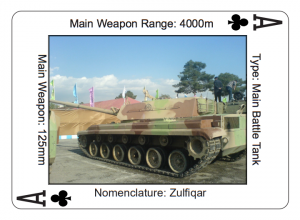In a not very subtle sign of the times, the U.S. Army has produced a deck of playing cards featuring weaponry used or held by Iran in order to familiarize soldiers with Iran’s inventory of weapons and presumably to facilitate their recognition on the battlefield.
The Iran collection follows similar decks of playing cards illustrated with Chinese and Russian weapons.
Another set of U.S. Army playing cards featuring North Korean weapons systems is forthcoming.
By preparing credible, bipartisan options now, before the bill becomes law, we can give the Administration a plan that is ready to implement rather than another study that gathers dust.
Even as companies and countries race to adopt AI, the U.S. lacks the capacity to fully characterize the behavior and risks of AI systems and ensure leadership across the AI stack. This gap has direct consequences for Commerce’s core missions.
The last remaining agreement limiting U.S. and Russian nuclear weapons has now expired. For the first time since 1972, there is no treaty-bound cap on strategic nuclear weapons.
As states take up AI regulation, they must prioritize transparency and build technical capacity to ensure effective governance and build public trust.
